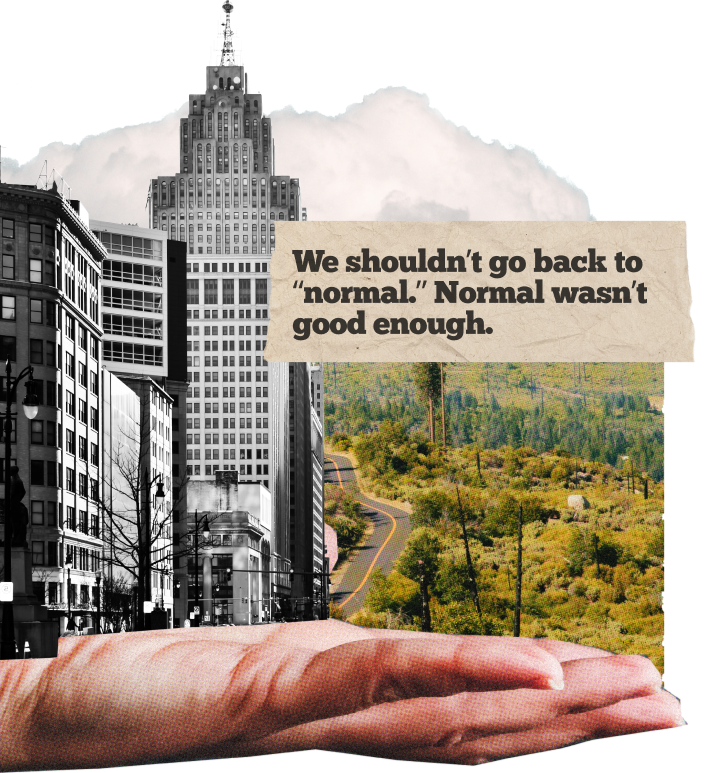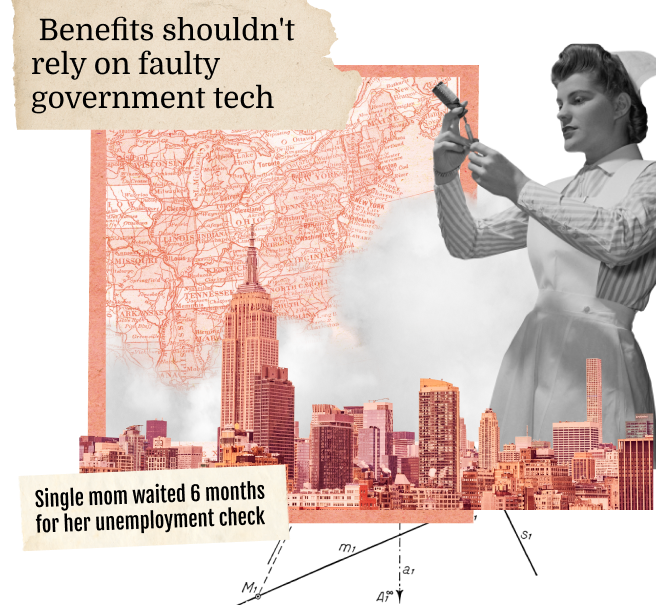Impact
OUR IMPACT SO FAR
In 2020, we helped get emergency economic relief to 215,000 of the most vulnerable families.
While we now work to address root causes vs. symptoms, the outcomes listed below speak to our ability to move nimbly and strategically, center equity, and deliver results. In 2020, we:
Helped to provide emergency cash relief to 215,000 workers and families hardest hit by the COVID-19 pandemic.
Unlocked $115M+ in philanthropic funding for emergency cash relief.
Funded a surge in policy advocacy and communications on workplace health and safety, helping to earn the issue a day one executive order.
Supported a coalition of economists and policy analysts to make an evidence-based case for an expanded social safety net.
Supported 26 grassroots nonprofits or networks to create or strengthen emergency cash transfer systems, including integrating digital payment options.
OUR IMPACT STRATEGY
What we’re targeting next
We are now at a crucial moment. The coming together of the pandemic, economic, and racial crises is our once-in-a-generation chance to profoundly transform the economy. We are no longer just focused on rapid response, but are now setting our sights on systems change and the ways we can accelerate shared, longstanding goals by leveraging the unique opportunities in this economic recovery period. Through our fund, we strive towards two critical long term impact goals.
The first is Recover Up. An initiative to deliver job pathways that enable economic security and mobility. Through Recover Up, we will deliver jobs that enable economic security and mobility for struggling workers, and leverage new federal and employer investments to hopefully propel unprecedented scale.
The second is 21st Century Benefits. Its goal is to help repair and reimagine the public benefits system so that it better enables families to stay afloat and recover from crises — with an initial focus on unemployment insurance.
Whether you’re a grantseeker or a prospective funder, if our goals resonate with you, then please get in touch.


RECOVER UP
Jobs that sustain and uplift
After COVID-19 rocked our nation’s economy and took millions of individuals out of work, lawmakers and advocates across the political spectrum worked to pass legislation with the potential to expand access to good jobs. The Bipartisan Infrastructure Law, Inflation Reduction Act, and CHIPS and Science Act collectively set aside more than $2 trillion in federal investments to create and shape millions of economic mobility-boosting jobs for the next decade and beyond.
Using these dollars to their full potential is crucial to avoiding a “recover down” scenario where unemployed people are forced to accept jobs well below their skill, benefits, and pay levels and thereby spiral into further economic hardship. If leveraged correctly, these funds represent an opportunity to change the lives of families and individuals who have historically been left out of the country’s prosperity.
The Families and Workers Fund is ready to meet this moment with a rapidly-executed, equity-centered workforce strategy to connect families with pathways to good jobs and upward mobility.
We aim to do this by making grants and building strategic partnerships within the nonprofit, public, and private sectors to:
- Scale up worker-centered, good jobs solutions led by and for directly impacted people, including immigrants, people of color, LGBTQ identities, women, young people, and others locked out of opportunity.
- Leverage public and private investments to advance good jobs and equity in the workforce.
- Build public discourse and business action by moving and shaping them to advance good jobs.
Many of these solutions are waiting for the right grantees and funders. So if you are either and want to be involved, please get in touch.
recover up | Powering Climate & Infrastructure Careers for All
REBUILDING OUR PLANET THROUGH GOOD JOBS
Last year, the U.S. government took a historic step forward in combating climate change when they committed nearly $2 trillion to support our country’s transition to a clean energy future. The challenge? Our workforce is currently millions of specialized workers short of the total needed to take on the jobs that will be created by the clean energy transition and there is no guarantee that these new jobs will meet the wage, benefits, and other standards of the good jobs movement.
The Families and Workers Fund sees these historic spending bills and the millions more in private funding the government dollars will unleash as an opportunity to support job training initiatives to prepare individuals to take on these newly created, economic mobility-boosting jobs and support the country through the upcoming infrastructure upgrades. Through collective action, we can ensure that this wave of opportunities meet the skill, benefits, and pay scale standards of the good job movement – all while supporting state and local governments as they transition to a clean energy future and create new onramps to family-sustaining jobs for overlooked talent.
We know that climate change will not resolve on its own. And as it continues to warm the planet, people living low-income communities – both rural and urban – are disproportionately impacted by challenges related to global warming. The government’s historic investment, along with the private investment it will release, is expected to create 9 million jobs over the next decade – most of which are good, economic-mobility boosting careers aimed at greening energy and infrastructure. This moment is a crucial opportunity for those who have been historically excluded from our country’s prosperity to secure long term financial stability, improve infrastructure in their own communities, and, in turn, deepen public support for the climate movement.
The U.S. workforce has been underinvested for more than a decade, with women and people-of-color facing the greatest consequences. Without an effective, equity-centered workforce strategy quickly put in place, there is a risk that these momentous policies could perpetuate inequities or even fail altogether – just as we’re getting started.
Here’s how we plan to seize the moment:
- Inclusion, equity, and access: Ensure that training is accessible to all, especially people living on low incomes, people of color, women and gender minorities, young people, and others who have historically faced barriers and inequities in pursuing climate and infrastructure careers. Invest in catalytic training initiatives and accessible career on-ramps and retention strategies that improve access to clean energy and infrastructure.
- Scalable training and quality jobs: Activate our big-tent philanthropic model to scale training models to prepare workers to place into, advance, or experience improved job quality in clean energy and infrastructure careers. Ensure these new, climate jobs are good jobs by supporting worker-centered organizations and partnerships with government and business to align job quality goals.
- Local planning and implementation support: Invest in state/local workforce planning, implementation, and innovation to help the public sector quickly build resources and access partners and investments. Deliver coordinated, strategic grants and partnerships to leverage public investments and help those dollars achieve their best and highest use for both people and the planet.
recover up | good jobs
DEFINING & EXPANDING JOB QUALITY
In June 2022, the Families and Workers Fund and U.S. Department of Labor (DOL) gathered in D.C. with hundreds of government leaders, workers, and allies to discuss, plan for, and commit to tangible goals around improving job quality for workers and families throughout the country. With 4,000 people attending in person and online, the inaugural Good Jobs Summit marked the largest federal government event dedicated to advancing good jobs.
Since then, we’ve built on the work conducted at the Summit by publishing an evidence-based Good Jobs Champion Statement defining the qualities that make up a good job. This definition was endorsed by nearly 250 signatories – from Fortune 500 companies to labor unions – making it the most widely endorsed definition of job quality.
Simultaneously, we produced a Reimagining Job Quality Measurement report to synthesize job quality data from across industries to capture the holistic experience of the workers who power our economy and make recommendations about how best to improve working conditions. Our work on job quality has been featured in media like the New York Times, The Chronicle of Philanthropy, U.S. News, among others.
We are proud of our collaborative work with government, employers, and workers to develop creative solutions to knock down the biggest obstacles between workers and economic mobility. This work to define and measure job quality provides a foundation for our ongoing efforts to scale job quality through our Powering Climate & Infrastructure Careers for All Initiative, Recover Up, and future initiatives.
21st century benefits
Increasing Access. Improving Delivery.
As one of the richest nations in the world, the United States has more than enough financial capacity to support every adult, child, and family through and out of economic hardship. And yet, one-third of the U.S. population – or 90 million people – live at or near poverty. Meanwhile, billions of dollars in public benefits go unused each year in the U.S. due to confusing processes, daunting paperwork, outdated technology, and other burdensome administrative requirements. These sorts of avoidable problems should not prevent those who need benefits most from obtaining the financial security to which they are entitled.
We know that solving access and delivery problems in the public benefits system is one of the most direct, immediate routes to reduce poverty in the United States, make lives better, and guarantee a base of economic security. And despite the challenges, now is the perfect moment for change. The President’s Executive Order on improving customer service delivery and the experience of expanding benefits during the beginning of the COVID-19 pandemic has galvanized new action and dedicated resources.
Using this new momentum, we aim to repair, redefine, and reimagine our public benefits system by:
- Ensuring increased access to equitable public benefits that reduce racial and other disparities by improving outreach, enrollment, and recertification; innovating benefits data infrastructure.
- Testing public benefits pilots and scaling innovative models that improve benefits delivery, focusing on best practices such as talent, data sharing, procurement, outreach, and other evidence-based mechanisms.
- Expanding our focus to address unemployment insurance in conjunction with other large-scale public benefits that support economic security and mobility, such as tax credits (Earned Income Tax Credit, Child Tax Credit), TANF, SNAP, and WIC.
- Coordinating philanthropy, nonprofits, and the public and private sectors to increase the impact and efficacy of the benefits access ecosystem, aligning around best practices, shared learnings, and evidence-based models.
Many of these solutions are waiting for the right grantee and funder. So if you are either and want to be involved, please get in touch.

What's New?
Families and Workers Fund Awards $12+ Million for Underinvested Communities to Fill Workforce Gaps as Clean Energy Transition Accelerates
Learn more
The Families and Workers Fund’s 2023 Annual Report highlights $14.5 million in new grantmaking, impacting more than 4.5 million people to date.
Learn more
Families and Workers Fund Announces $45+ Million Initiative to Help Strengthen U.S. Public Benefits System
Learn more
The Aspen Institute Financial Security Program and the Families and Workers Fund Convened Leaders to Strengthen Public Benefits Delivery in Over 25 States
Learn more
Families and Workers Fund Launches $50 Million Initiative to Advance One Million Good Careers in Climate and Infrastructure
Learn more
The Families and Workers Fund’s 2022 Annual Report Highlights $31 Million in Direct Grantmaking
Learn more